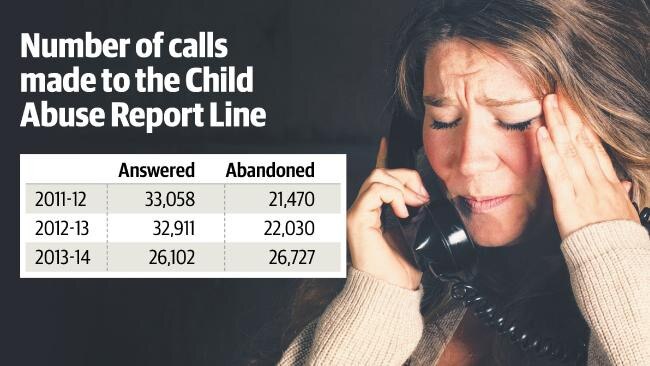Push to reform Child Abuse Report Line after 15,000 calls go unanswered
CALLS are growing for a priority hotline for police, health workers or teachers to report abuse to Families SA, to ensure the most urgent and serious cases get through.

SA News
Don't miss out on the headlines from SA News. Followed categories will be added to My News.
- 15,000 calls to child abuse line go unanswered
- Families SA’s call centre under pressure as reports grow
CALLS are growing for a priority hotline for police, health workers or teachers to report abuse to Families SA, to ensure the most urgent and serious cases get through.
Academics and welfare agencies are among those who say a direct line for mandatory notifiers and frontline workers would help because they are best informed about what constitutes abuse or neglect.
There are also calls to improve the online reporting system to better elicit key information from people with concerns about children.
It follows revelations in The Advertiser that more than 15,000 calls to the Child Abuse Report Line were abandoned last financial year, as average waiting times blew out to more than 20 minutes. Half of all the calls made the year before also went unanswered.
The failing has prompted the State Government to recruit 10 “civilians”, who will be trained as “dedicated call-takers” and enter data directly into the computer case management system for social workers to assess later.

However, frontline workers and welfare advocates want greater reform.
Some are suggesting two abuse hotlines — one for mandated notifiers and another for other concerned members of the public.
The suggestion is similar to the police system, which takes urgent calls on 000 and less urgent matters on 131 444.
Child Protection Reform Minister John Rau is open to the idea.
“It makes sense that there should be a priority or urgent stream somehow where a child that is in urgent or immediate harm should be triaged in a different way,” he told The Advertiser.
“But I don’t know how you do that yet.”
Anglicare SA chief executive Peter Sandeman said police, health and child welfare workers should be given the “highest priority” when making reports to Families SA because they “have the background knowledge of the child and the family, and the professional expertise to effectively judge urgency and severity” of cases.
UniSA child protection expert Elspeth McInnes said it “does make sense to have a more direct route (to Families SA) for professionals”.
“I suppose it wouldn’t hurt to prioritise those frontline professionals,” she said.
Dr McInnes also called for “more and better prompts” to elicit information through the online reporting system, e-CARL.
A Families SA worker told The Advertiser that up to 60 per cent of reports made through e-CARL were too vague to be useful, because reporters were not asked specific enough questions.
“They’ll give what they think is important but they don’t know the information that Families SA need and they don’t give specific details,” the worker said.
Dr McInnes said there was “ room to really greatly improve the understanding of professionals and lay people in the community” about making reports of suspected abuse or neglect.
Mr Rau agreed there may need to be a more concerted effort to educate people about which concerns to report to authorities.




